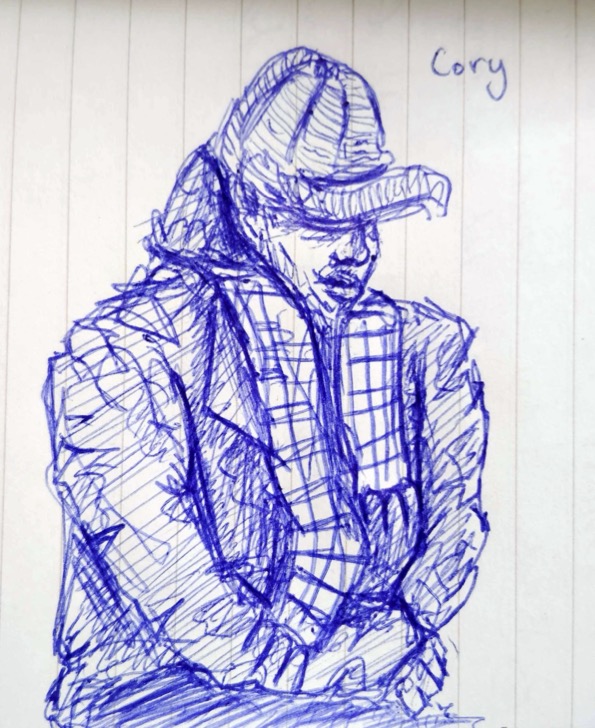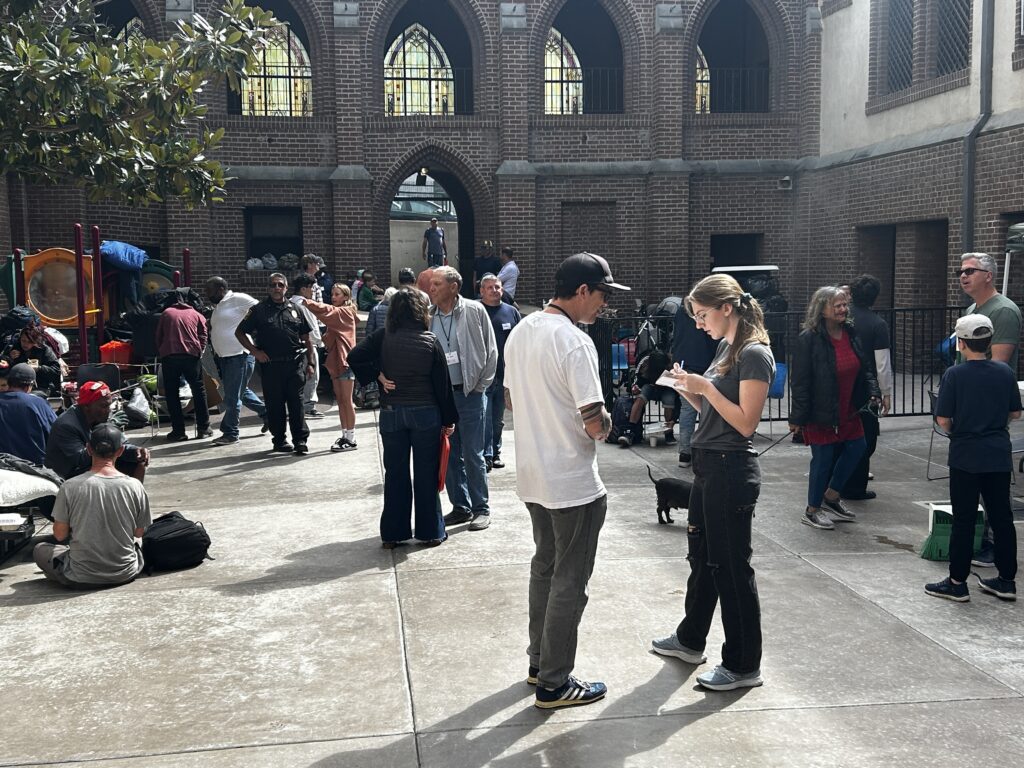
Enough blue ink can become the image of a tattered, plaid scarf. A camouflage jacket warming its weary wearer. Two shy eyes beneath the brim of an orange and brown baseball cap noticed the pen’s attention to them. When I showed Cory his portrait, he smiled.
Cory and about 300 more unsheltered guests arrived at Ladle Fellowship at First Presbyterian Church in downtown San Diego on Sunday, March 31, between 2 and 4 p.m., for a hot meal. The church was packed on this last day of March since government aid checks often run low at the end of the month for those who rely on them.
My honors humanities cohort and I, led by our professor, Ben Cater, served that day at Ladle Fellowship with many volunteers. Other school groups, like La Jolla High School’s class trip and Mt. Carmel’s Lacrosse team, stood alongside us helping, as well as retired people, parents and young children.
Elizabeth Rico, youth and young adults director at First Presbyterian, said that Ladle Fellowship attracts many international churches, especially those from Korea and China.
After the group prayer, the volunteers divided to help at six different stations: haircut corner, foot washing station, clothing requests, device charging, property department and street corner care.
These stations had a powerful impact on more than 2,500 people over the 42 years of Ladle. The ministry has given 3,233 meals, 994 clothing orders, 178 haircuts and has seen 363 people at street corner care. Pascal Dickinson, the director of Ladle, gave me these hopeful statistics.

Rico advised me to seek him out for my next interview. She described his leadership as “contagious.” I set off on my journey through the sunny, bustling courtyard to find the person who matched Rico’s description: a lanky, tattooed man with a baseball cap embroidered with “Never Grow Up.”
Exploring the ministry was a complex experience. Some homeless visitors were practically dragging themselves inside the wide doors, exhausted, hungry, dirty or wounded. I saw the enormous load of their situation weighing heavy on their stooping backs.
Yet, they came vulnerable and open. People closed their eyes and relaxed at the haircut station, allowing volunteers to massage their scalp with soap and snip away. They took a load off at the biblically-inspired foot washing station. The tents offered simple services – nothing glamorous. I had never considered these small moments of relief to be luxuries, but they had the power to lift heavy burdens, visibly easing people’s bodies and minds.
One upbeat visitor, Dereck “D-Rock” Williams, was also looking for Dickinson. We started chatting in the meantime, and I learned that Williams was a first tenor in the San Diego Street Choir, a homeless choir that performs Sunday nights at various churches, including First Presbyterian.
Williams reminisced about performing with Voices of Our City in 2020 on America’s Got Talent, an audition that earned a golden buzzer from judge Terry Crews and a standing ovation from Howie Mandel, another judge.
Williams was telling me about his interest in getting dental implants to improve his singing abilities, when suddenly I spotted the words “Never Grow Up” floating above the crowd. “Lanky” was right. I was one of many to approach Dickinson; visitors and volunteers alike were drawn to him, greeting him, asking questions and exchanging updates about their lives and the church. He called them all by name and returned the excitement.
When my turn to talk to Dickinson arrived, I realized I was not only receiving Ladle’s life story but also his own.
In 1983, Ladle Fellowship didn’t begin as the miraculous, altruistic, godly event that it is today. It originated as a sidewalk table meant to serve coffee and donuts to young businessmen amid the area’s corporate growth. However, instead of suits and ties, the table was attracting rags and blankets. Ladle was transformed to tend to this alternate need, and the homeless ministry was born, according to the website.
Dickinson got involved in the service in 2016 when Resurrection Presbyterian Church, where he served as a deacon, started renting out space. Dickinson used his cosmetology license to create the haircut program. A few years later, the jack-of-all-trades shifted to helping at street corner care, as he was enrolled in prerequisite classes for nursing school. Finally, after losing his salesman position due to the 2023 Solar crash, Dickinson was invited to apply for the director position of Ladle from Jeff Myers, the head pastor, in 2024.
While Dickinson spoke energetically about Ladle and his journey, a steady flow of unsheltered visitors continued to crowd around him. People came asking for second servings of food, extra blankets and cat food. Having walked around the shelter earlier, I knew it had limited supplies.
Yet, Dickinson never said “no.” I didn’t hear a single request be dismissed, turned away or rejected. He engaged in conversations to find ways around scarcity.
When a woman asked for a blanket without a ticket, he told her to wait at the end of the line and explain her situation — someone would help.
Williams reappeared to greet Dickinson and continued the conversation about dental implants that he and I had talked about earlier. Dickinson told Williams the names of a few friends who offer free dental care downtown, and the two worked out the details.
I didn’t fully understand how, but Ladle had created a sense of abundance out of scarcity.
Dickinson called Ladle a bright reflection of Jesus Christ, full of humility and servitude. As our interview carried on, he shared his personal experience with the brokenness those experiencing homelessness were facing.
After a car accident in 2006, Dickinson was dependent on opioids, praying to God to reveal himself. He struggled for three years with the addiction.
It was not until 2009 that a miraculous event brought Dickinson back to faith – the birth of his son.
Fatherhood demanded Dickinson’s full presence, attention and unconditional love — something he knew wouldn’t be possible with his drug use, he said. He felt that God had been shaping him his entire life for this. Even at 14 years old, stacking chairs and making coffee at 12-step program meetings, Dickinson knew that being there for others was an essential part of who he was. If he were to leave that behind, he’d be leaving himself, and worse, God, behind.
Dickinson said he was grateful for God’s trials and gifts, all preparing him to serve as the director of Ladle today. The beautiful display of human perseverance, abundance and humility radiated off of the church as he finished off the interview with a fitting verse:
“Truly I tell you, whatever you did for one of the least of these brothers and sisters of mine, you did for the least of me” (Matt. 25:40).
